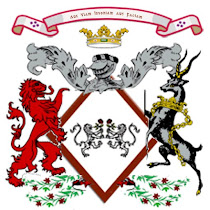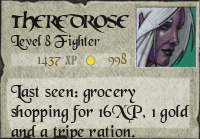Burns Night is celebrated on January 25th with Burns suppers around the world, and is still more widely observed than the official national day of Scotland, Saint Andrew's Day, or the proposed North American celebration Tartan Day. The format of Burns suppers has not changed since Robert's death in 1796. The basic format starts with a general welcome and announcements followed with the Selkirk Grace. Following the grace comes the piping and cutting of the Haggis, where Robert's famous Address To a Haggis is read, and the haggis is cut open. The event usually allows for people to start eating just after the haggis is presented. This is when the reading called the "immortal memory", an overview of Robert's life and work is given; the event continues with many toasts and some presentation of a selection of his works and usually concludes with the singing of Auld Lang Syne.
I am most pleased and honored to host another Burns Night celebration in world, this year with Rowan Derryth. Happily, we also have Soliel Snook providing hours of wonderful Celtic music for us, creating a wonderful aural atmosphere on Isle of Skye. Additionally, a number of our friends will be giving toasts, reciting stories or poems, and assisting in the preparations.
**If you would like to provide a toast or reading during the supper, please email me : evabellambi@gmail.com. **
This is another of those unique, more prescribed, events which bring a little pomp and circumstance into our virtual existance. Brilliantly the formality of tradition builds in humor and joy by way of the toasts, and stories, and poems/songs of the night.
But just who was this Robert Burns?
Robert Burns (25 January 1759 – 21 July 1796) (also known as Rabbie Burns, Scotland's favourite son, the Ploughman Poet, the Bard of Ayrshire and in Scotland as simply The Bard) was a poet and a lyricist. He is widely regarded as the national poet of Scotland, and is celebrated worldwide. He is the best-known of the poets who have written in the Scots language, although much of his writing is also in English and a 'light' Scots dialect, accessible to an audience beyond Scotland. He also wrote in standard English, and in these pieces, his political or civil commentary is often at its most blunt.
He is regarded as a pioneer of the Romantic movement and after his death became an important source of inspiration to the founders of both liberalism and socialism. A cultural icon in Scotland and among Scots who have relocated to other parts of the world (the Scottish Diaspora), celebration of his life and work became almost a national charismatic cult during the 19th and 20th centuries, and his influence has long been strong on Scottish literature.
As well as making original compositions, Burns also collected folk songs from across Scotland, often revising or adapting them. His poem (and song) Auld Lang Syne is often sung at Hogmanay (New Year), and Scots Wha Hae served for a long time as an unofficial national anthem of the country. Other poems and songs of Burns that remain well-known across the world today, include A Red, Red Rose, A Man's A Man for A' That, To a Louse, To a Mouse, The Battle of Sherramuir, and Ae Fond Kiss.
from the Wikipedia entry on Robert Burns
As is always my tradition, we will conclude our night of revelry with a Ceilidh. Laugh, dance, remember, and love each other.
*****
For in the works of Robert Burns we see the whole cosmos of man’s experience and emotion, from zenith to nadir, from birth until death.
Len G. Murray





2 comments:
This sounds fantastic! I really want to come but I have a schedule conflict! Would it be possible for me to come see the setting another time, before you change it?
I'm hoping there's a report coming on this; I wasn't able to make it in world due to a stomach virus.
Post a Comment